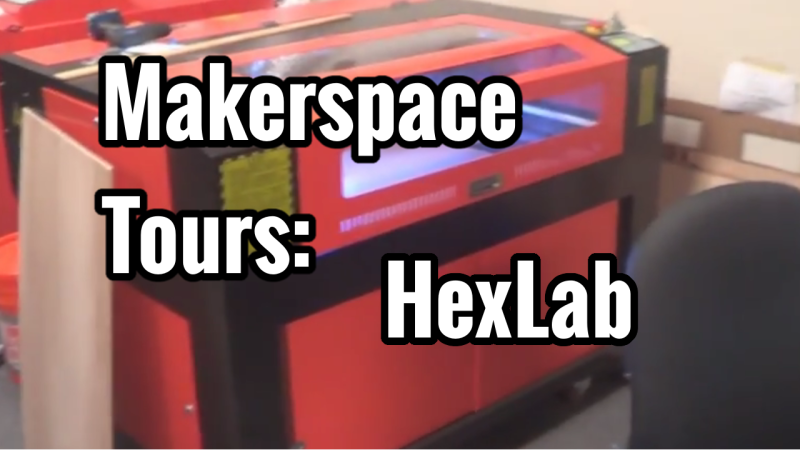This time around, we dive into the world of 3D printing and laser cutting at a local community-driven space near Van Nuys, California. We were invited to visit HexLab Makerspace by [Jonathan] and [Mike] who own and run the company. They showed us the large selection of resources that they have made available to the public. This includes a variety of 3D printers, laser cutters, industrial sewing machines, 3D scanners, computer workstations, wood working tools, manual metal lathes, heaps of testing equipment, a leather embossing/hot stamping machine, and even a plastic injecting machine. And yes, they have a ventilator too.
With all this equipment, HexLab has the ability to prototype practically anything that floats into the mind of someone walking in the door. Specialties include paper craft, costume tailoring, laser etching wood products, manufacturing acrylic glass objects, and much more.
What makes this place different from a lot of other makerspaces is the history of the company. Originally, they started as a Research and Design firm about 14 years ago and have recently opened up the doors to the outside community. Because they began as a business that was previously similar to a hackerspace, they had already acquired the necessary tools for the space. The change makes the tools accessible to entrepreneurs, artists, designers, and musicians alike. This has bred a fantastic teaching environment where the community helps each other through the learning process.
In the future, HexLab plans to continue hosting classes and has even hinted at an up-coming mobile project that is certain to spark a local and portable maker movement. Eventually, they would like to help develop a sustainable model that can be given out to other makerspaces in an effort to assist in the creation of additional places like this. In the meantime though, we look forward to seeing how the community grows through them, and what types of amazing products with be produced out of their space.
















That dude from 6:00 – so much hype, so little useful work.
Now I’m going to have to watch the video because of your comment. I was going to leave some kind of a snide remark and not even watch.
He lost me at “Star Trek replicators”…
It’s interesting that we are going through this with the open source movement. These skills that are being promoted used to be valued and passed on as part of a system of apprentices, journeymen and masters. It’s really nice that the movement is starting up like it is, but I just think that there are a lot of skills sitting around bored out of their skulls in nursing homes that wouldn’t mind teaching some of this. Yet no one is looking in that direction.
I wouldn’t be too concerned about the Star Trek replicators comment. That was an awkward analogy to what he mention a few moments before; the ability of people to operate what are essentially small replicators in their homes. while cottage industry might work fine for the production of non-essential items, I doubt a return to it for essential items could be good for the labor producing the items.
Chances are pretty good that there are many in nursing homes with skills and knowledge they could pass on, but they are there for a variety of reasons, and those would have to be addressed or worked around first. Would have been great of the original Foxfire Project would have spurred similar in other regions of the US and the world. Supposedly it has, but it hard to find the others.
They’re my local space and I’ve taken some of their classes – albeit several months ago – and I am really glad a space with a laser cutter is near by. However, here’s my take on them and please tell me if im out of line or whatever…
They’ve pivoted from a private R&D firm to an ‘open shop’ R&D firm that uses the ‘MakerSpace’ concept to get perhaps a few new clients into their office. Mainly, however it seems that classes and membership (20$/day, 55$/mo …??) pricing structure generates their income, but they didnt facilitate the ‘incubator’ mentality while I was there – just focused on getting people in and out for classes. Their building space is too small (notice all the equipment stashed away in the vid?) and they offer very limited open lab hours – nothing past 9pm, or 4pm on a weekend – so it seems difficult to work on a project while working a 9-5 job.
As far as I’m concerned you aren’t out of line and you do bring up things I’d think every hackerspace has to struggle with. Lack of room fot al available or desired equipment. A inability to satisfy everyone with the hours it can be open. I wouldn’t want to manage a space that allows only one person working alone. Accidents can and do happen. Best if 2 or more members are in the lab or a paid employee is present. Additionally I’d require all members pass first aid training as a condition of membership, just common sense. Every hackerspace is going to have to determine a dues structure that keeps the space sustainable, while not discouraging interest. I’m glad doing that isn’t part of my job description at any organization.
Profitable is a term I’d wouldn’t use in association with hacker space because it’s one that raises the hackles of many individuals. Keeps the doors open should be safe to say; I think. I wonder how many places there are in the world where similar metamorphosis similar to this could occur?